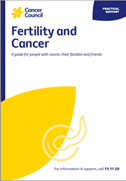- Home
- About Cancer
- Managing side effects
- Fertility and cancer
- Treatment side effects and fertility
- Surgery
Surgery
Surgery that removes part or all of the reproductive organs to treat cancer can cause infertility.
Removal of one or both ovaries (oophorectomy) – If one ovary is removed, the other ovary should continue to release eggs and produce hormones. You will still have periods and, if you still have a uterus, you may be able to become pregnant. If both ovaries are removed (bilateral oophorectomy) to treat ovarian cancer, you will experience immediate and permanent menopause. You will no longer have periods or be able to become pregnant naturally.
Removal of the uterus and cervix (hysterectomy) – This type of surgery may be used to treat cancer of the cervix, ovary, uterus, and sometimes, cancer of the vagina. After a hysterectomy, there is nowhere for a baby to develop and your periods will stop. Sometimes the ovaries will also be removed. If your ovaries are left in place and continue to work, you may be able to fertilise your eggs through IVF and use a surrogate to carry the pregnancy.
Removal of the testicles (orchidectomy) – Treatment for testicular cancer usually involves removing one testicle. If you have had one testicle removed, you can go on to have children naturally. However, men with testicular cancer have lower fertility rates than the general population. The urologist may advise you to store sperm at a sperm banking facility before the surgery, just in case you have fertility problems in the future.
In some rare cases, both testicles are removed (bilateral orchidectomy). This causes permanent infertility because you will no longer produce sperm. You will still be able to get an erection.
Removal of the prostate (prostatectomy) – Treatment for prostate cancer usually involves removing the prostate and seminal vesicles, and sealing the tubes from the testicles (vas deferens). This causes permanent infertility because you will not be able to ejaculate semen during orgasm. This is known as a dry orgasm. In some cases, semen may go back towards the bladder instead of forward into the penis (retrograde ejaculation).
Removal of the penis (penectomy) – Part or all of the penis may be removed to treat cancer of the penis. The part of the penis that remains may still get erect with arousal and may be long enough for penetration. It is sometimes possible to have a penis reconstructed after surgery, but this is still considered experimental and would require another major operation.
Removal of the bladder, prostate or one or both testicles – This may damage the nerves used for getting and keeping an erection (called erectile dysfunction or impotence). Erectile dysfunction may last for a short time or be permanent.
It may be possible for the surgeon to use a nerve-sparing surgical technique to protect the nerves that control erections. This works best for younger men who had strong erections before the surgery. However, problems with erections are common even with nerve-sparing surgery.
Some types of early-stage gynaecological cancers can be treated with surgery that preserves the ability to conceive. This is known as fertility-sparing surgery.
→ READ MORE: The impact of hormone therapy on fertility
Podcast: Coping with a Cancer Diagnosis
Listen to more of our podcast for people affected by cancer
More resources
Prof Martha Hickey, Professor of Obstetrics and Gynaecology, The University of Melbourne and Director, Gynaecology Research Centre, The Royal Women’s Hospital, VIC; Dr Sally Baron-Hay, Medical Oncologist, Royal North Shore Hospital and Northern Cancer Institute, NSW; Anita Cox, Cancer Nurse Specialist and Youth Cancer Clinical Nurse Consultant, Gold Coast University Hospital, QLD; Kate Cox, McGrath Breast Health Nurse Consultant, Gawler/ Barossa Region, SA; Jade Harkin, Consumer; A/Prof Yasmin Jayasinghe, Director Oncofertility Program, The Royal Children’s Hospital, Chair, Australian New Zealand Consortium in Paediatric and Adolescent Oncofertility, Senior Research Fellow, The Royal Women’s Hospital and The University Of Melbourne, VIC; Melissa Jones, Nurse Consultant, Youth Cancer Service SA/NT, Royal Adelaide Hospital, SA; Dr Shanna Logan, Clinical Psychologist, The Hummingbird Centre, Newcastle West, NSW; Stephen Page, Family Law Accredited Specialist and Director, Page Provan, QLD; Dr Michelle Peate, Program Leader, Psychosocial Health and Wellbeing Research (emPoWeR) Unit, Department of Obstetrics and Gynaecology, The Royal Women’s Hospital and The University of Melbourne, VIC; Pampa Ray, Consumer; Prof Jane Ussher, Chair, Women’s Health Psychology, and Chief Investigator, Out with Cancer study, Western Sydney University, NSW; Prof Beverley Vollenhoven AM, Carl Wood Chair, Department of Obstetrics and Gynaecology, Monash University and Director, Gynaecology and Research, Women’s and Newborn, Monash Health and Monash IVF, VIC; Lesley Woods, 13 11 20 Consultant, Cancer Council WA.
View the Cancer Council NSW editorial policy.
View all publications or call 13 11 20 for free printed copies.
Need to talk?
Support services
Coping with cancer?
Speak to a health professional or to someone who has been there, or find a support group or forum
Looking for transport, accommodation or home help?
Practical advice and support during and after treatment
Cancer information
Sexuality, intimacy and cancer
Learn more about the impacts of cancer on sexuality and intimacy
Managing side effects
Learn about the different side effects cancer and its treatment can cause, and how to manage them

